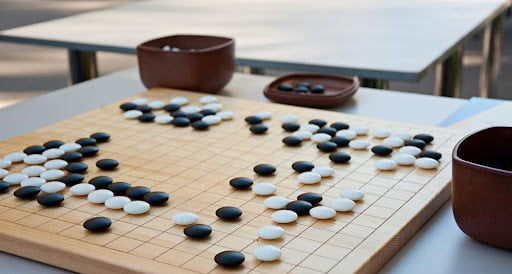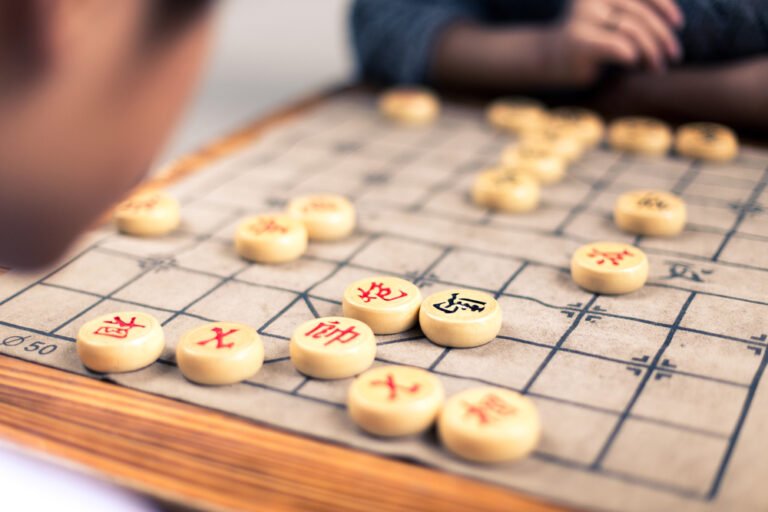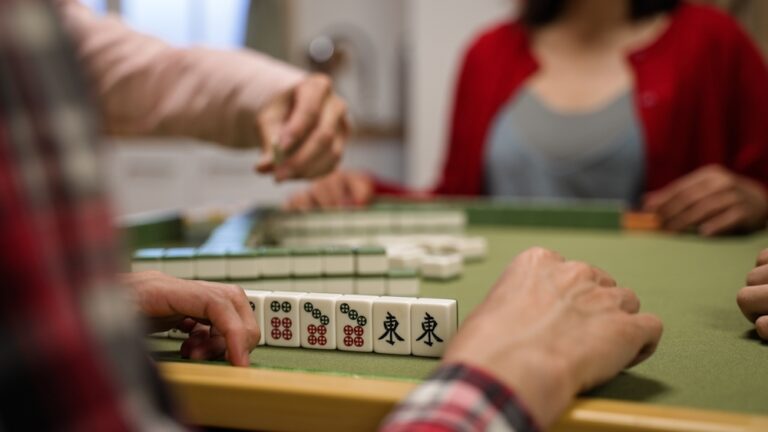12 Traditional Chinese Games and Outdoor Activities

Growing up in the West, my only exposure to Chinese games was the occasional match of Chinese chess. But when I started learning Mandarin, I discovered a whole new world of traditional Chinese games that provided a fun and effective language-learning tool.
In this blog, I’ll explore some of the benefits of using traditional Chinese games to learn Chinese, highlighting some of the most popular options across different categories.
The benefits of traditional Chinese games for language learners
First off, let’s just highlight the coolest aspects of traditional Chinese games for those looking to improve their Mandarin skills:
- Comprehensive language skill development: Traditional Chinese games help develop essential language skills, including speaking, listening, reading Chinese characters, and writing. They provide a holistic immersion experience, aligning perfectly with the immersive approach advocated by Mandarin Blueprint.
- Cultural insight and authenticity: Engaging in these games exposes learners to authentic Chinese culture. Each traditional Chinese game boasts a unique history and cultural background. By participating, you not only learn the game itself but also connect with decades of rich Chinese heritage, gaining a deeper understanding of the culture.

- Multisensory learning: Chinese games are extremely effective in engaging multiple learning styles, catering to visual, auditory, and kinesthetic learners alike. Think of it as a stimulating language-learning workout for your brain, appealing to various senses and cognitive processes.
- Reduced pressure environment: Traditional games create a low-pressure environment that encourages learners to practice and experiment with the language. This relaxed setting encourages confidence and experimentation, enabling language learners to take risks and refine their skills without the fear of making mistakes (even if they lose the game).
- Vocabulary expansion: Playing these games exposes you to a wide range of vocabulary and expressions specific to the game’s context. This practical exposure helps expand your Mandarin vocabulary organically.
- Contextual learning: Traditional Chinese games often involve conversations and interactions among players. This context-rich environment allows you to grasp real-life language usage, colloquial expressions, and social interactions in Mandarin.
- Enhanced memory retention: Learning and following the rules of these games require memory retention, which can significantly improve your ability to remember new words and phrases in Mandarin.
- Improved pronunciation: Frequent speaking and listening in the game setting can enhance your Mandarin pronunciation and accent. It provides a fun way to practice tone, pronunciation, and rhythm.
- Social interaction: Many traditional Chinese games are multiplayer, fostering social interactions in Mandarin. This allows you to engage in authentic conversations, practice social etiquette, and build connections with native speakers.
- Stress relief and motivation: Learning through games can reduce the stress associated with language learning, making the process more enjoyable and motivating. It encourages regular practice and a positive attitude toward language acquisition.
Incorporating traditional Chinese games into your language learning journey not only makes the process more enjoyable but also enriches your Mandarin proficiency by immersing you in language, culture, and diverse learning experiences.
Related Reading: Tips for a First-Time Visit to China
Popular Chinese board games
Let’s start with a look at some of the most popular traditional Chinese board games, where strategy, skill, and cunning come together to create hours of captivating entertainment. These board games not only offer intellectual challenges and opportunities for social interaction but also provide a window into the world of Chinese culture and history.
1. Chinese chess (象棋 xiàngqí)

Chinese chess (xiangqi) is a two-player strategy game played on a 9×10 grid board. Each player has an army of 16 pieces, including generals, advisors, elephants, horses, chariots, cannons, and soldiers. The objective is to capture the opponent’s general while protecting your own. Chinese chess helps you learn the characters and terminology for each chess piece, along with strategic thinking skills.
2. Weiqi/Go (围棋 wéiqí)
Weiqi, known as Go in Japan, is a two-player board game played on a 19×19 grid. Players take turns placing black or white stones on the board to surround territory and capture their opponent’s stones. Weiqi enhances critical thinking, strategy, and mental calculation skills. The simple rules allow beginners to pick it up easily, but there is incredible complexity and depth as you advance.
3. Tangram (七巧板 qī qiǎo bǎn)
The Tangram puzzle game involves seven geometric pieces — five triangles, one square, and one parallelogram. By rearranging these pieces, you can form shapes and objects. Tangram helps you learn Chinese vocabulary for shapes, colors, and positional/directional words. It also improves spatial reasoning and hand-eye coordination.
Related Reading: Debunked: Common Myths about Learning Chinese
Chinese card games and tile games
Prepare to shuffle, deal, and strategize your way through the world of traditional Chinese card games and tile games. From the iconic to the lesser-known, these games offer an opportunity to test your wits, hone your strategic thinking, and immerse yourself in the vibrant traditions of Chinese gaming.
4. Mahjong (麻将 májiàng)

As you probably already know, Mahjong is an extremely popular (and famous) Chinese tile game. Mahjong, a game that utilizes tiles, has enjoyed over three centuries of play in Asia and is increasingly popular worldwide. While mastering the game presents a challenge, newcomers can readily grasp the fundamental rules.
The 144 tiles have Chinese symbols, numbers, and characters engraved on them, so Mahjong builds number recognition, counting skills, visual pattern matching, and familiarity with Chinese symbols. It involves both luck and strategy. Mahjong is deeply ingrained in Chinese culture.
5. Dou Dizhu (斗地主 dòu dìzhǔ)
Dou Dizhu is a popular Chinese card game, often compared to poker. The objective is to form certain card combinations in your hand to beat your opponents. Playing Dou Dizhu improves your recognition of Chinese numbers and suits and counting skills as you track points. The fast-paced game encourages quick thinking and strategy.
6. Big Two (大老二 dà lǎo èr)
Big Two is a fun card game that uses a standard 52-card deck. Players race to be the first to discard all their cards by playing them in ascending or descending order in sets. Big Two helps you practice Chinese number words, suits, and counting skills. Remembering what cards have been played also improves your memory.
Related Reading: Numbers in Chinese: How to Count and More
Get physical with traditional Chinese sports and games
Let’s look next at some traditional Chinese sports and games, where physical prowess meets cultural heritage in a vibrant fusion of movement and tradition. These activities are more than just exercise. They’re a celebration of China’s sporting traditions and historical pastimes. Whether you’re looking for a dynamic workout or a cultural experience that gets you moving, these traditional Chinese sports and games have something to offer.
7. Shuttlecock (毽子 jiànzi)

Jianzi is a traditional Chinese game where players aim to keep a weighted shuttlecock or feathered cork in the air using any body part except the hands. Kicking, bouncing, and passing the shuttlecock back and forth requires good control and reflexes. Jianzi also helps reinforce Chinese vocabulary for body parts and action verbs.
8. Chinese Jump Rope (跳皮筋 tiào píjīn)
Chinese Jump Rope, known for its agility, balance, coordination, and rhythmic challenges, provides an engaging way to learn while having fun. Originating in 7th-century China and sometimes referred to as “French Skipping,” it offers a unique cultural connection for those learning Chinese.
This game requires minimal space and equipment, making it an excellent warm-up or cool-down exercise, adaptable for small groups or larger gatherings. For language learners, it presents an opportunity to practice Mandarin by calling out patterns and instructions in Chinese.
9. Diabolo (抖空竹 dǒukōngzhú)
The diabolo, also known as the Chinese yo-yo, is played by manipulating a spinning spool between two sticks, held one in each hand. Players toss the diabolo into the air, catch it on a string, and perform other acrobatic moves. Diabolo helps improve hand-eye coordination while learning action verbs and position words.
10. Knucklebones (抓拐 zhuā guǎi)
Knucklebones involves tossing small bones or pebbles into the air and catching them on the back of the hand. The goal is to collect the most bones. Similar to jacks, knucklebones improve agility, quick reflexes, and finger flexibility. It might not be the best game for learning difficult Chinese words, but (when you lose), you’ll probably get to use any Chinese cuss words you know!
Get ready to unlock the power of conversation and boost your Mandarin skills in a lively and interactive way with our selection of social games. These games aren’t just about rules and competition; they’re your passport to real-world conversations and authentic language experiences.
11. Guess Finger Game (猜拳 cāi quán)
The Guess Finger Game, known as “猜拳 cāi quán” in Chinese, is a traditional Chinese game often played as a drinking game (but you should always be aware of local customs, so make sure you know how to drink alcohol like a local and not make a scene).
In this quick and easy game, two players simultaneously extend their fingers while shouting out a number between two and 20. The goal is to shout a number that matches the total number of fingers extended.

If successful, the player wins, while the one who shouts a lower number loses and must take a drink as a penalty. To enhance the enjoyment of the game, players use creative phrases like “two kind brothers” for two, “three stars shining” for three, “making a fortune in four seasons” for four, and so on.
This game adds a playful twist to traditional Chinese board games and sports, offering a unique and entertaining experience.
12. Eagle Catches Chicks (老鹰捉小鸡 lǎoyīng zhuō xiǎo jī)
Children hold each other’s waists in a line — the front child is the “mother hen,” and the others are “chicks”. One child is the “eagle” who tries to catch chicks as they all maneuver around. This teaches family terms, position words, and action verbs.
Related Reading: How to Learn Chinese Easily
Immerse yourself in Chinese culture through games
Part of learning a new language is discovering the culture. Traditional Chinese games offer a doorway into China’s rich history, bringing the language to life. Next time you practice Chinese, go beyond flashcards and give a classic Chinese game a try. Your Mandarin skills will improve by leaps and bounds.
But that’s not all. If you’re eager to accelerate your Mandarin learning journey and want a personalized plan to achieve fluency faster, we’ve got an exciting opportunity for you.
Are you ready to take your Mandarin skills to the next level? Discover a thrilling opportunity that will not only accelerate your Mandarin learning journey but also provide you with personalized insights and guidance for faster fluency.
Introducing the Mandarin Fluency Scorecard — your gateway to unlocking Mandarin proficiency in record time. This powerful free tool assesses your current Chinese language skills and tailors a customized roadmap to fluency, all in under a minute.
Imagine having a clear understanding of your strengths and weaknesses, with actionable steps to enhance your Mandarin abilities.
You’ll answer just 12 straightforward questions carefully designed by Mandarin experts. These questions will not only determine your proficiency but also pinpoint areas for improvement, including pronunciation, reading, listening, speaking, and learning habits.
Once you receive your score, you’ll gain access to a comprehensive report that provides an honest analysis of your Mandarin skills. It’s like having a personal language coach at your fingertips.
Don’t miss out on this opportunity to turbocharge your Mandarin learning journey. Take the first step towards fluency today.
It’s completely free and takes just 60 seconds.








